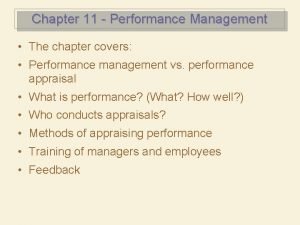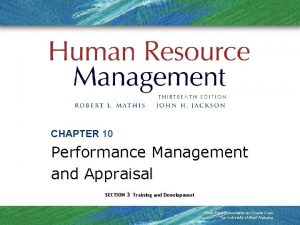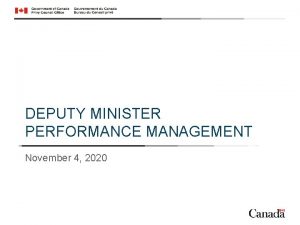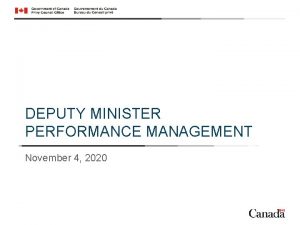DEPUTY MINISTER PERFORMANCE MANAGEMENT May 16 2019 DEPUTY











- Slides: 11

DEPUTY MINISTER PERFORMANCE MANAGEMENT May 16, 2019

DEPUTY MINISTERS The responsibilities of a Deputy Minister are best understood in the context of the support they provide Ministers, who are responsible to the elected House of Commons. The Deputy Minister is the principal source of support for a Minister in fulfilling his or her collective and individual responsibilities and respecting his or her accountability to Parliament. In providing this support, the Deputy Minister is responsible for ensuring: • • sound public service advice on policy development and implementation, both within the Minister's portfolio and with respect to the government's overall policy and legislative agenda; effective departmental management, as well as advice on management of the Minister's entire portfolio; and fulfilment of authorities that have been assigned to the Deputy Minister or other departmental officials either by the Minister or directly by virtue of legislation. Deputy Ministers also have responsibilities related to the collective management of the government, which include responding to the policies of the Ministry as a whole and ensuring that appropriate interdepartmental consultation occurs on any matter that may touch upon broader ministerial responsibilities. 2

CLERK OF THE PRIVY COUNCIL • As Secretary to the Cabinet, he or she assists the Prime Minister in maintaining the cohesion of the Ministry and giving direction to it. In this role, the Clerk of the Privy Council and Secretary to the Cabinet provides support and advice to the Ministry as a whole to ensure that the Cabinet decision-making system operates according to the design of the Prime Minister. • As Head of the Public Service, he or she serves as the principal link between the Prime Minister and the Public Service of Canada, and is responsible to the Prime Minister for the institution’s overall performance and its effective management. • As the Prime Minister’s Deputy Minister, the incumbent provides advice and support to him in areas that are of special concern to his role as head of government. The Prime Minister looks to the Clerk of the Privy Council for advice in appointing and managing senior office holders and organizing the government, in operating the Cabinet decision-making system, in setting overall policy directions, in enhancing intergovernmental relations, and in managing specific issues. 3

SENIOR PERSONNEL & PUBLIC SERVICE RENEWAL Provide advice and support to the Prime Minister and the Clerk of the Privy Council, both as Secretary to the Cabinet and as Head of the Public Service, to build a strong, professional and competent public service. This includes: § Setting strategic directions for leading and renewing the Public Service. § Supporting the Prime Minister in making high-quality Governor in Council (Gi. C) appointments. § Establishing and administering human resources management policies and services for the effective recruitment, appointment, compensation and performance management of Gi. C appointees. 4

MANAGEMENT FRAMEWORK APPOINTMENTS The recruitment of high quality senior leaders in accordance with the relevant legislation, policies and guidelines WORKFORCE ANALYSIS An understanding of the current and future human resource needs SUCCESSION PLANNING The identification of a pool of potential future successors for senior leaders positions DEVELOPMENT & SUPPORT PERFORMANCE MANAGEMENT A workplace that fosters a Measuring and rewarding the competent and strong individual achievement of senior leaders community results COMPENSATION Compensation and classification policies that facilitate the recruitment and retention of senior personnel including the terms and conditions of employment 5

OBJECTIVES • To encourage excellent performance by setting objectives that are linked to corporate plans, government objectives and leadership competencies; • To recognize and reward strong performance and identify under-performance; and, • To provide a framework within which a consistent and equitable approach to performance management can be applied. 6

PROGRAM OVERVIEW 7

ASSESSMENT OF PERFORMANCE • Each Minister is interviewed by the Clerk to obtain views on DM performance. • A retired DM is engaged to interview colleagues, portfolio contacts, committee chairs to obtain views on DM performance. • PCO Deputy Secretaries, TBS (MAF), PSC, COL, CHRC provide comments on organizational and individual performance. • Assessment of DM performance is done by the Senior Leadership Circle on Performance and Talent Management over a period of two days. • The Committee takes into account circumstances (e. g. new appointment; tough policy/program agenda; effort, etc. ) and makes a recommendation to the Clerk. • Clerk makes final recommendation to the Prime Minister. 8

FEEDBACK • Clerk and Deputy Clerk meet individually with each Deputy Minister and Associate Deputy Minister. • Feedback includes concrete examples, recommendations for learning, setting of new objectives. • Assistance (coaching, mentoring) is offered. • Results are used to inform future succession planning. 9

COMPENSATION Performance Award (Pay) • The final amount of performance pay reflects: Ø the degree to which the objectives in all 3 categories were achieved, Ø the relative contribution of the individual, Ø the scope and complexity of the individual’s challenges, and Ø the manner in which the results were achieved. Performance Award Elements • • • Economic increase Salary range increase Performance Pay 10

ANNUAL RESULTS Individual Results Year Total Did Not Meet / Unable to Assess Succeeded+ Surpassed 2012 -13 93 6 (6. 4%) 10 (10. 7%) 38 (40. 9%) 30 (32. 3%) 9 (9. 7%) 2013 -14 85 2 (2. 4%) 5 (5. 9%) 48 (56. 5%) 23 (27. 1%) 7 (8. 1%) 2014 -15 90 5 (6%) 13 (14%) 33 (37%) 31 (34%) 8 (9%) 2015 -16 88 5 (5. 7%) 36 (40. 9%) 28 (31. 8%) 9 (10. 2%) 2016 -17 90 4 (4. 4%) 10 (11. 4%) 13 (14. 4%) 36 (40%) 29 (32. 2%) 8 (8. 9%) 11
 Chapter 11 performance appraisal - (pdf)
Chapter 11 performance appraisal - (pdf) Performance management vs performance appraisal
Performance management vs performance appraisal Matter of matrimony
Matter of matrimony The great gatsby chapter 9 analysis
The great gatsby chapter 9 analysis National core standards south africa
National core standards south africa Who was the first prime minister of india
Who was the first prime minister of india Optionale istorie aprobate de minister
Optionale istorie aprobate de minister My kinsman, major molineux summary
My kinsman, major molineux summary Much to everyone's dislike the outspoken
Much to everyone's dislike the outspoken Chief minister special cell in tamil
Chief minister special cell in tamil Sample letter to minister of foreign affairs
Sample letter to minister of foreign affairs The minister's black veil drawing
The minister's black veil drawing





















